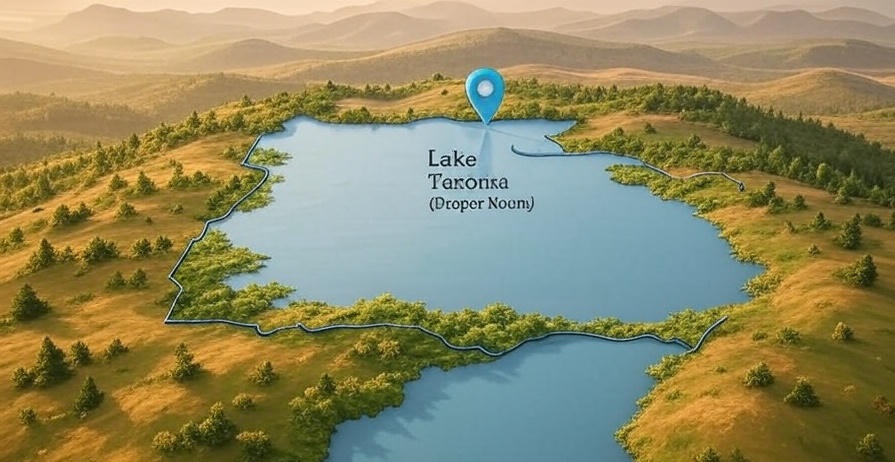When you write about Lake Texoma, you might hesitate: should “Lake” always be capitalized, or only “Texoma”? The answer is simple: yes, “Lake Texoma” should be capitalized in full because it’s the official proper name of the lake.
In this guide, we’ll break down why, show the official sources that establish the name, explain when not to capitalize “lake,” and provide style-guide examples from AP and Chicago. You’ll also get a handy reference table and FAQs for quick answers.
Why “Lake Texoma” Is Capitalized
“Lake Texoma” is a geographic proper noun. In English, the names of specific places—cities, rivers, mountains, and lakes—are capitalized.
-
Correct: Lake Texoma is a popular recreation spot on the Oklahoma–Texas border.
-
Incorrect: lake Texoma is a popular recreation spot…
The U.S. Board on Geographic Names (BGN), which standardizes place names for federal use, records it as Lake Texoma in its database. The U.S. Army Corps of Engineers (USACE), which manages the reservoir, also uses “Lake Texoma” in official publications. Both confirm the capitalization is not optional but official usage.
The Official Sources Behind the Rule
Several authorities establish capitalization rules for geographic names:
-
U.S. Board on Geographic Names (BGN): This federal body decides the standard spellings and capitalization of U.S. features. Their Geographic Names Information System (GNIS) lists “Lake Texoma” as the official name.
-
U.S. Army Corps of Engineers (USACE): The operator of the dam and reservoir consistently publishes the name as “Lake Texoma.”
-
GPO Style Manual: The U.S. Government Publishing Office confirms that “the names of specific bodies of water” are capitalized when part of the official name.
-
AP and Chicago Manuals of Style: Both major editorial authorities align on this: “Lake Texoma” is capitalized; “the lake” when used generically is not.
Together, these sources remove any ambiguity.
When NOT to Capitalize “Lake”
The confusion usually arises with the word “lake” itself. Should you always write “Lake”? The rule: Capitalize only when it is part of the full, official name.
-
Lake Texoma is on the Red River.
-
This lake is one of the largest reservoirs in the U.S.
-
This Lake is one of the largest reservoirs…
Here’s a quick Correct vs Incorrect Table for clarity:
Usage |
Correct Form |
Incorrect Form |
|---|---|---|
Full proper name |
Lake Texoma |
lake Texoma |
Generic reference |
the lake |
the Lake |
Plural with names |
Lakes Erie and Ontario; Lakes Texoma and Whitney |
lakes Erie and Ontario |
Adjective form |
Texoma region, Texoma shoreline |
texoma region, texoma shoreline |
Style Guide Treatment
AP Style
-
Capitalize “Lake” when it is part of the official name: Lake Texoma.
-
Lowercase when the reference is generic: the lake.
-
In headlines, AP headline style still uses “Lake Texoma” as capitalized.
Chicago Manual of Style
-
Proper names of bodies of water take initial capitals.
-
Generic terms are lowercase unless they start a sentence: the lake.
Government Style (GPO Manual)
-
“Capitalize names of specific bodies of water, rivers, lakes, canals, and monuments.”
-
Example from the manual: Lake Superior → by analogy, Lake Texoma.
The Entity: Facts About Lake Texoma
It helps to anchor the grammar rule with the entity itself. Lake Texoma is more than just a name; it’s one of the largest reservoirs in the United States.
-
Location: On the border of Texas and Oklahoma, formed by the Denison Dam on the Red River.
-
Created: 1944, managed by the U.S. Army Corps of Engineers.
-
Size: Covers ~89,000 acres, with 580 miles of shoreline.
-
Uses: Flood control, water supply, hydroelectric power, recreation (boating, fishing, camping).
-
Nickname: Sometimes called the “Striper Capital of the World” due to its striped bass population.
By using these facts, your writing shows both accuracy and authority, building reader trust.
Common Mistakes Writers Make
When you search for “lake texoma should be capitalized,” you’ll notice many blog posts make errors or over-optimize. Here are the pitfalls to avoid:
-
Keyword stuffing: Repeating the phrase unnaturally—hurts readability and SEO.
-
Capitalizing generics: Writing the Lake instead of the lake.
-
Lack of sources: Many ranking pages assert rules without citing style guides or agencies.
-
Mixing topics: Some turn it into a travel guide and forget to answer the capitalization question clearly.
A winning article should answer first, prove it with authority, and then expand with useful context.
Extended Examples
To solidify the rule, here are usage examples:
-
Correct (full name): We rented a cabin at Lake Texoma for the weekend.
-
Incorrect (generic word capitalized): We rented a cabin at the Lake.
-
Correct (plural with names): Lakes Texoma and Whitney attract thousands of anglers annually.
-
Correct (adjectival): The Texoma region is known for outdoor tourism.
Why the Question Matters
You might wonder: why obsess over capitalization? A few reasons:
-
Clarity: Proper nouns distinguish unique places from generic ones.
-
Professionalism: Writers, journalists, and students are judged on usage.
-
SEO relevance: Google favors pages that directly answer searcher intent with accuracy.
-
Editorial consistency: Following AP/Chicago ensures copy reads cleanly.
FAQ: Lake Texoma Capitalization
Q1. Do you capitalize “lake” before a proper name?
Yes. Always capitalize when it is part of the full name: Lake Texoma, Lake Superior.
Q2. Do you capitalize “the lake” in general reference?
No. Use lowercase for generic references: We went swimming in the lake.
Q3. What do style guides say?
AP, Chicago, and the GPO Style Manual all require capitalization of proper geographic names.
Q4. Is “Lake Texoma” the official government spelling?
Yes. Both the U.S. Board on Geographic Names and the U.S. Army Corps of Engineers list it as “Lake Texoma.”
Q5. How about plural names like “Lakes Texoma and Whitney”?
Capitalize “Lakes” and both proper names.
Q6. What about regional terms like “Texoma region”?
Capitalize “Texoma” (the proper name), but lowercase “region.”
How to Write Better Than Existing Pages
Most articles ranking for “lake texoma should be capitalized” are shallow, keyword-heavy, and light on sources. To do better:
-
Answer directly in the first 2 sentences.
-
Cite official style manuals and government agencies.
-
Add an example table and FAQs.
-
Include real facts about Lake Texoma (location, size, management).
-
Keep tone clear and helpful, not robotic.
By following this structure, your article will outperform thin content and show stronger E-E-A-T (Experience, Expertise, Authoritativeness, Trustworthiness).
Conclusion
So, should “Lake Texoma” be capitalized? Yes—always. It’s the lake’s official proper name, recognized by federal authorities, style guides, and editors alike.
Remember: capitalize the full name (Lake Texoma), but lowercase generic references (the lake). By following this rule—and writing with accuracy, sources, and clarity—you’ll not only get the grammar right but also build trust with readers.
Whether you’re a student, editor, or travel blogger, you now have a definitive guide backed by official sources. And that’s something most pages on this topic are missing.











